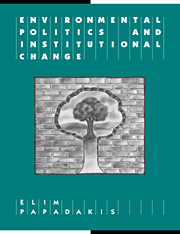Book contents
- Frontmatter
- Contents
- List of Tables and Figures
- Preface and acknowledgements
- Abbreviations
- Part I Introduction
- Part II Political Institutions, Innovation and Social Change
- 4 The ‘centrality’ of political institutions
- 5 The circularity of political communication and dialogue
- 6 Disrupting the circularity of political communication: the role of social movements
- 7 Design, evolution and the environmental movement
- Part III Political Organisations and Adaptation
- Part IV The Media, Agenda Setting and Public Opinion
- Part V Conclusion
- Appendix: Codes used in tables 9.1 to 12.1
- Notes
- References
- Index
5 - The circularity of political communication and dialogue
Published online by Cambridge University Press: 18 December 2009
- Frontmatter
- Contents
- List of Tables and Figures
- Preface and acknowledgements
- Abbreviations
- Part I Introduction
- Part II Political Institutions, Innovation and Social Change
- 4 The ‘centrality’ of political institutions
- 5 The circularity of political communication and dialogue
- 6 Disrupting the circularity of political communication: the role of social movements
- 7 Design, evolution and the environmental movement
- Part III Political Organisations and Adaptation
- Part IV The Media, Agenda Setting and Public Opinion
- Part V Conclusion
- Appendix: Codes used in tables 9.1 to 12.1
- Notes
- References
- Index
Summary
The Responsiveness and Effectiveness of Institutions
After exploring further the implications of the investigation by Luhmann into social systems, this chapter discusses the central question of the obstacles to and possibilities for an effective response by political institutions and organisations to challenges like environmentalism. Although Luhmann, as indicated earlier, highlights some of the obstacles that prevent effective responses by government and politics, I will concentrate on the ways in which groups and organisations with divergent interests and driven by different logics (for instance, economic growth or environmentalism or political power) engage in some form of constructive dialogue or conversation or rational communication.
One could infer that the term ‘rational communication’ originated in the work of writers like Habermas because of the experience of Germany of the ‘irrationality’ of fascism. If that were the case, it could also be argued that the concept is of limited value, both as an ideal type and as a way of describing empirical instances outside particular social, historical and geographical settings. While these arguments appear plausible, the aim of this book is to demonstrate the usefulness of this concept, or at least of the concept of constructive dialogue (which represents an elaboration of the notion of rational communication), in a variety of social, historical and geographical settings. This is not to suggest that the process of constructive dialogue will be smooth or easy.
- Type
- Chapter
- Information
- Environmental Politics and Institutional Change , pp. 36 - 47Publisher: Cambridge University PressPrint publication year: 1996

